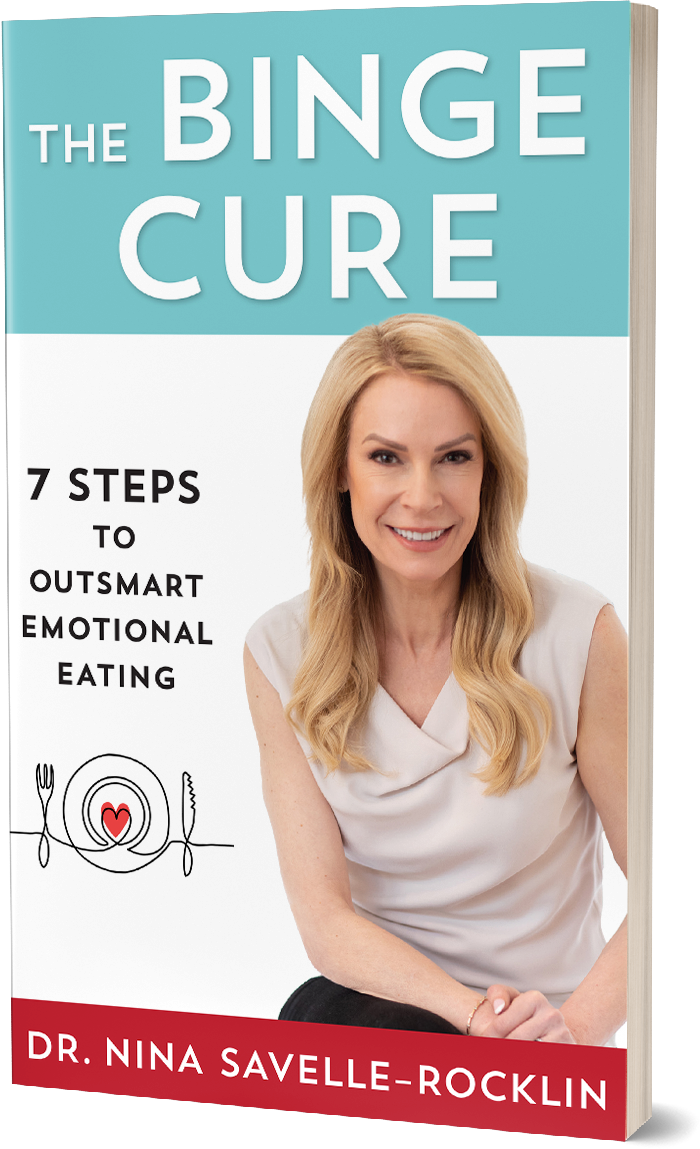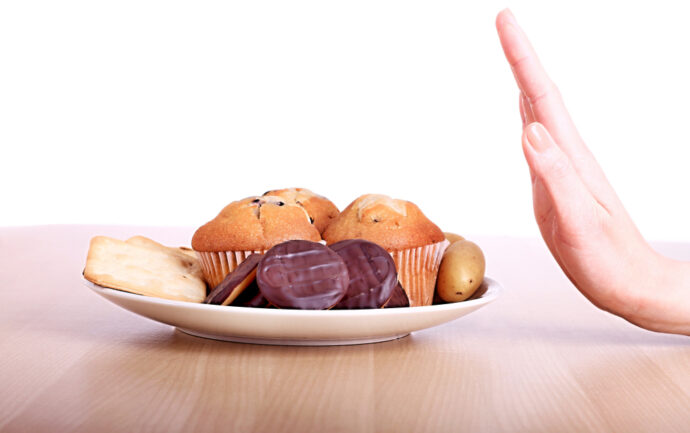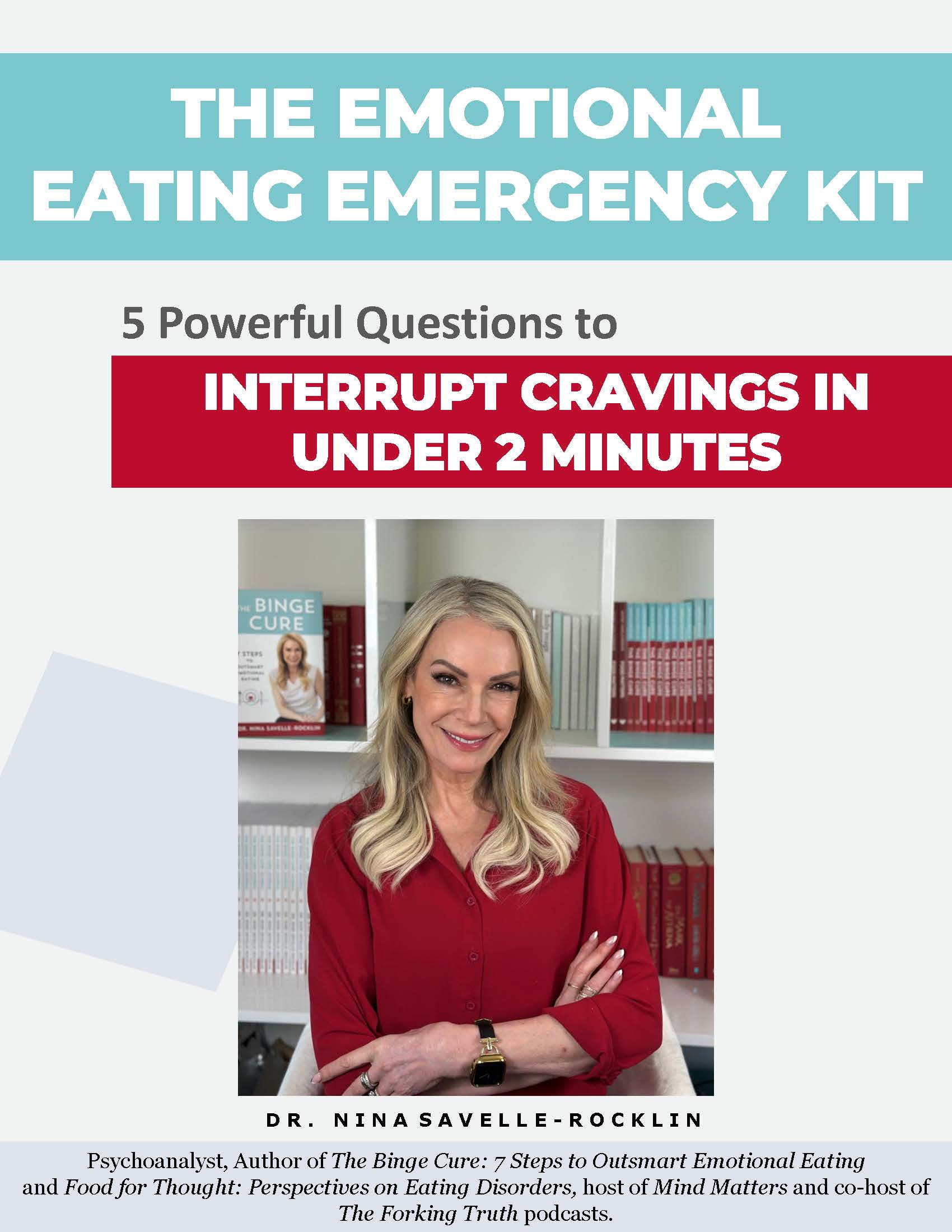Dr. Nina Savelle-Rocklin
From Shame to Self-Worth: How to stop Binge Eating

Table of Contents
- What is low self-esteem?
- What causes low self-esteem?
- The Role of Shame & Negative Self Talk
- Breaking the Shame Spiral
- Frequently Asked Questions
Stella was barely holding onto hope when we first met. Her shoulders were slumped and her eyes downcast. She said, “I just can't seem to stop binge eating, and it's making me feel so bad about myself.”
It's common for binge eating to be intertwined with feelings of low self-esteem. But here’s what’s important to understand: binge eating can often be a way of coping with difficult emotions or situations that feel overwhelming. It's not a reflection of your character or your worth.
Stella thought that her binge eating led to low self-esteem, but in reality it was the reverse. Low self-esteem leads to binge eating, which in turn causes guilt and shame, diminishing your self-worth, and the cycle continues.
When our self-esteem is already low, eating is a temporary way to feel better or to numb out those difficult feelings. But this cycle can make you feel worse in the long run, creating a loop that's hard to escape. Each time you binge eat, it can reinforce negative thoughts about yourself, feeding into that low self-esteem.
The key is to break this cycle by addressing not just the behavior, but the underlying emotions and beliefs about yourself that are contributing to it. It's about learning to respond to yourself with compassion instead of criticism, and finding new, supportive ways to cope.
The goal is to identify the underlying triggers for your binge eating and develop new strategies for dealing with those feelings. It's a process and it takes time, but with the right support, you can get to a place where your self-worth isn't tied to your eating habits, and you can feel good about yourself again.
What is low self-esteem?
Low self-esteem is a negative perception and evaluation of yourself. It's a deep-seated belief that you are not worthy, competent, or valuable. People with low self-esteem often see themselves as inadequate or inferior and may constantly compare themselves unfavorably to others.
They often have a distorted self-image, where they perceive their abilities, achievements, and physical appearance in a negative light. This can manifest as a persistent feeling of not being good enough or a belief that they will never measure up to the expectations of others or their own.
Low self-esteem is not just a momentary feeling of insecurity or self-doubt. It's a chronic condition that affects a person's overall outlook on life. It can impact their relationships, job performance, and physical health. It's a pervasive sense of self-deprecation that permeates every aspect of their life.
What causes low self-esteem?
Low self-esteem can stem from various factors including childhood experiences, traumatic events, or negative societal messages. It can be influenced by ongoing struggles with depression, anxiety, and more.
Low self-esteem is a pervasive feeling of not being good enough or not measuring up to societal or personal standards. It often stems from negative life experiences, such as criticism, rejection, or failure, that lead to a distorted self-image. This distorted self-image can trigger feelings of worthlessness, shame, and self-criticism, which are emotionally distressing and can lead to a search for coping mechanisms. One such coping mechanism is binge eating.
Low self-esteem can lead to harmful behaviors as we attempt to cope with our negative self-perception. This can include self-isolation, self-sabotage, substance abuse, or binge eating. These coping mechanisms often make the problem worse, creating a vicious cycle of self-deprecation and self-destructive behavior.
It's important to note that low self-esteem is not a fixed state. With the right support, you can learn to challenge your negative self-perceptions, build self-compassion, and improve your self-esteem. This involves acknowledging your worth, accepting imperfections, and cultivating a healthier relationship with yourself.
The Role of Shame & Negative Self Talk
Stella described her eating behavior as her “secret shame” and she felt deeply embarrassed about the nightly binge eating episodes in which she felt a loss of control, followed by periods of intense self-criticism. She had a 25 year history of binge eating and was desperate to create lasting change, but she'd struggled so long that she was afraid there was no hope.
Low self-esteem and shame are intricately linked, often fueling each other in a harmful cycle. Low self-esteem is a negative evaluation of yourself, characterized by a lack of self-worth and confidence.
Shame, on the other hand, is when people have a sense that there is something inherently flawed about them, and therefore unworthy of love and belonging. They may perceive their actions or behaviors as proof of their inherent unworthiness, reinforcing their negative self-perception.
In the context of binge eating, this can be particularly destructive. The act of binge eating can be a coping mechanism to temporarily escape the emotional discomfort associated with low self-esteem and shame. Yet, the aftermath of a binge often brings about feelings of guilt and further shame, which can lower self-esteem even more. It's a vicious cycle.
Breaking this cycle requires addressing both low self-esteem and shame. It's important to challenge and change negative thought patterns, and cultivate self-compassion in order to create a kinder self-view. By addressing these root causes, it's possible to break the cycle and reduce the urge to binge eat.
Growing up, Stella internalized the idea that her value was contingent on her achievements and physical appearance, which was perpetuated by critical parental messages. She had developed a self-concept that depended on external validation and felt a chronic sense of inadequacy.
Each night, she'd think about the mistakes she'd made that day and ruminate over them endlessly. Her mind would replay every perceived misstep and awkward interaction, magnifying them until they overshadowed any of her accomplishments.
This nightly ritual of self-criticism became the catalyst for her binge eating episodes. Feeling overwhelmed by a sense of inadequacy, she turned to food for comfort and as a way to silence the harsh inner dialogue,. But each binge left her feeling more self-loathing, reinforcing her poor self-esteem. Binge eating was both a symptom and a cause of her deep-seated feelings of unworthiness.
Breaking the Shame Spiral
You're not alone if you've ever found yourself caught in the cycle of negative self-talk and emotional eating. Like Stella, when you're struggling with low self-worth, it can become all too easy to berate yourself with a negative internal dialogue, feelings of shame, and a sense of inadequacy. These unpleasant emotions are overwhelming, leading to diminished self-esteem.
When Stella began to recognize her pattern of using binge eating as salve for her low self-esteem and shame, she started to create meaningful change. She learned to encourage and support herself instead of tearing herself down.
The more she was a friend to herself, the less binge eating she did. She started feeling better about herself and focused on enjoying her life more instead of constantly slave-driving herself to meet other people's expectations. Eventually she stopped binge eating for good.
Here are the exact steps that helped Stella create lasting change:
1. Crack the Code of Emotional Eating
Self-shaming can be a sneaky way to protect ourselves from more painful emotions. Recognizing these defense mechanisms is like finding the secret door to our inner world. The first step to stop self-shaming that leads to binge eating is to recognize and acknowledge the pattern.
This involves becoming aware of the negative self-talk and self-criticism that often precedes a binge eating episode. It can be helpful to keep a journal to track these thoughts and behaviors, noting what triggers them and how they make you feel. Identify which emotions or conflicts are present right before you feel the urge to binge.
2. Do Some Emotional Gardening
Let's dig deep. Self-shaming often sprouts from beliefs and experiences buried in our past. Think about those moments from your childhood or earlier years that left a mark. Understanding these origins is the first step toward healing. Our early relationships, especially with caregivers, shape so much of who we are. Reflecting on these relationships can reveal patterns that contribute to self-shaming. It's a journey back in time, but it's worth every step.
For example, Stella's mother apologized every time she made a mistake. Her mother would say things like, “I'm such an idiot” or, “How could I have been so stupid?” She never said anything like this to Stella, but she modeled this way of self-relating. Stella internalized this attitude and constantly beat herself up for being, “such an idiot” and “so stupid” which made her feel bad, leading to binge eating as a way to soothe and distract herself.
3. Learn to Express Emotions
Our emotions are our compass; they guide us, but sometimes we lose our way. Society often encourages us to hide our feelings, but it's healthy and necessary to express them. Remember, everyone experiences a range of emotions, and it's okay to not be okay sometimes.
Expressing and understanding our emotions is crucial, especially those we tend to push aside. Let's give them the attention they deserve. Expressing emotions begins with self-awareness. This involves identifying and acknowledging your feelings. You might feel a range of emotions at any given time, and it's important to recognize each one. This could involve saying to yourself, ‘I feel sad' or ‘I am feeling anxious.' Recognizing your emotions is the first step towards expressing them.
Once you've identified your emotions, try to understand why you're feeling this way. This involves looking at the events or circumstances that led to these feelings. For example, if you're feeling angry, try to pinpoint what has made you feel this way. Understanding the ‘why' behind your emotions can help you express them more effectively.
Writing can be a powerful tool for expressing emotions. Journaling, for instance, allows you to articulate your feelings without fear of judgment. Writing about your emotions can provide a sense of release and can also help you understand them better.
4. Cultivate Self-Compassion
Self-compassion is like a soothing balm for self-shaming. It's about being kind and understanding toward ourselves, even when we stumble. Treat yourself with the same kindness, understanding, and forgiveness that you would extend to a good friend. Instead of berating yourself for overeating, try to understand why it happened and what you can do differently next time. This can help to reduce feelings of shame and guilt that often fuel the cycle of binge eating.
Instead of calling herself name, Stella learned to respond to herself as she would a friend. She validated and acknowledged her emotions and reassured herself that she had the ability to get through difficult, challenging times. The more she did this, the less she turned to food for comfort or distraction.
In conclusion, breaking free from the cycle of negative self-talk and binge eating requires more than just tackling the symptoms of binge eating – it calls for a deeper introspection and addressing the root cause of low self-esteem. Cultivating self-esteem is a crucial step towards breaking this cycle. This involves being kind towards yourself and attending to your emotions, giving expression to them, and learning to respond to yourself in a soothing and comforting way.
When you are able to rescue your self-worth from the clutches of self-doubt and negative self-perception, the overpowering urge to binge begins to lose its grip. After all, the first step towards healing is understanding the problem.This journey may not be easy, but it is definitely worth it. There is hope.
How to Stop Binge Eating
Understanding the intricate relationship between low self-esteem and binge eating is vital towards forging a path to recovery. Realizing that binge eating is not simply a matter of willpower but a desperate bid for emotional relief can unleash compassionate perspectives. It enables us to acknowledge our self-worth and cultivate self-compassionate practices as opposed to punishing ones.
We must strive to ‘crack the code' of our emotional eating patterns, ‘garden' our emotional landscapes, express our emotions, and foster self-compassion. Remember, the journey to healing is not linear, and it's normal to falter. Consider seeking professional help if you find the issue persists. Together, we can break the cycle of low self-esteem and binge eating, creating a healthier, happier future.
Frequently Asked Questions
In this section, we delve into the most popular question regarding how to stop binge eating. From differentiating binge eating to emotional eating to whether body image impacts eating behaviors or not, we will answer all the relevant questions to separate fact from fiction.
1. What is binge eating, and how is it different from overeating or emotional eating?
Binge eating is characterized by the consumption of large amounts of food in a short period, often accompanied by a sense of loss of control. Unlike overeating, binge eating is driven by emotional distress and isn't always linked to hunger. Understanding these distinctions is crucial for recognizing and addressing binge eating behaviors.
Let's break this down:
Overeating
Overeating can be simply described as eating more than your body needs in a particular instance – take the case of a second slice of cake at a party, or an extra helping at dinner. While overeating isn't always great for our waistlines, it's generally an isolated incident and doesn’t necessarily have an emotional component. It's a one-off that doesn't typically spiral into a regular habit. Overeating is a case of not recognizing or honoring our body's fullness cues, often due to external factors like peer pressure or occasion-driven indulgence.
Binge Eating
Binge eating, on the other hand, regularly involves consuming large amounts of food in a short period. A binge eater might feel out of control during these episodes and experience guilt, distress, or embarrassment afterward. It's a little more serious than the occasional over-indulgence, as it's often connected to a sense of loss of control. It doesn't always tie to emotions – many binge eaters cannot identify triggering emotional states before a binge.
Emotional Eating
And finally, emotional eating is more complex, where food becomes a coping mechanism for managing negative or uncomfortable emotions. Whether it's stress, anxiety, sadness, or even boredom, emotional eaters consume food not out of physical hunger, but rather emotional hunger. Emotional eating, unlike overeating and binge eating, is directly tied to the individual's emotional state.
It's important to underline the differences between these eating patterns as treating them requires different strategies. And remember, acknowledging your patterns is the first step towards healthier eating habits.
2. What role does shame play in binge eating, and how can it be addressed?
Shame often accompanies binge eating and can create a vicious cycle. It's essential to acknowledge and address the underlying emotional triggers leading to shame. Cultivating self-compassion, seeking support from loved ones or professionals, and developing healthy coping mechanisms are key strategies to break free from the grip of shame associated with binge eating.
3. Are there specific triggers that contribute to binge eating, and how can they be managed?
Identifying personal triggers is a crucial step in managing binge eating. These triggers can vary from person to person and may include stress, boredom, or certain emotions. Developing awareness around these triggers and implementing healthier coping mechanisms, such as mindfulness techniques or engaging in fulfilling activities, can be instrumental in preventing binge episodes.
4. Can self-worth and body image impact binge eating behaviors?
Yes, low self-worth and negative body image can contribute to binge eating. Building a positive self-image, practicing self-love, and challenging negative thoughts are essential components of overcoming binge eating. Fostering a healthy relationship with oneself can significantly impact one's ability to break free from the cycle of binge eating.
5. How can someone seeking help for binge eating find appropriate support and treatment options?
Seeking professional help from therapists, counselors, or support groups specializing in eating disorders is a crucial step. Additionally, reaching out to friends and family for emotional support is valuable. Various therapeutic approaches, including cognitive-behavioral therapy (CBT) and dialectical behavior therapy (DBT), have proven effective in treating binge eating disorders. It's essential to recognize that seeking help is a sign of strength and the first step toward a healthier relationship with food and oneself.

Sick of obsessing about every bite?
GET THE CURE
The Binge Cure Book!
Enter “CURE” to receive a 20% discount.
I’d love to conquer binge eating by ordering Dr. Nina’s book, The Binge Cure!
No, I don’t want access to this terrific resource to help me overcome binge eating.
The Author

Dr. Nina Savelle-Rocklin is a renowned author and podcast host and one of the nation’s leading psychoanalysts known for the psychology of eating. Her signature message of, “It’s not what you’re eating, it’s what’s eating ‘at’ you” has resonated with hundreds of thousands of listeners from around the globe in 40 countries. As founder of The Binge Cure Method, she guides emotional eaters to create lasting food freedom so they can take back control of their lives and feel good in their bodies.
Related Blogs




















